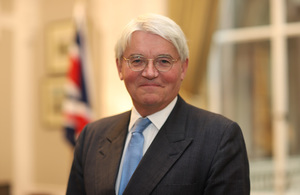UK aid will save over one million lives from killer diseases
New UK support to the Global Fund will help fight AIDS, tuberculosis and malaria.

- the UK is again contributing to the Global Fund to help fight 3 of the deadliest diseases around the world
- the UK’s funding will save lives through prevention of and treatment for HIV, tuberculosis and malaria and strengthening health systems
- the UK remains the third largest ever donor to the Global Fund
New UK aid support to the Global Fund will help fight AIDS, tuberculosis, and malaria around the world, Minister for Development Andrew Mitchell announced today (Monday 14 November).
As a founding supporter of the Global Fund, the UK is its third largest ever donor, having contributed £4.4 billion since its inception. The Global Fund has saved 50 million lives since it was set up by the G7 in 2002.
In 2021 alone, the Global Fund provided 23 million people with lifesaving antiretroviral therapy for HIV and 5.3 million with TB treatment and care. It also treated 148 million cases of malaria and helped distribute 133 million mosquito nets to protect families from malaria.
The UK is providing £1 billion over 3 years to the Global Fund, which will help save more than one million lives around the world and pay for interventions to help a much larger number of people stay safe.
From this new commitment:
- 2 million people with HIV will receive antiretroviral therapy
- more than 1 million people will receive TB treatment and care
- 86 million mosquito nets will be distributed to protect children and families from malaria
- over 28 million new infections or cases across the 3 diseases will be avoided by diagnosing and treating those already infected to prevent further spread and supporting prevention services such as mosquito nets
- health systems will be strengthened which will help with pandemic preparedness
Minister for Development Andrew Mitchell said:
The UK and others founded the Global Fund because we refused to accept the loss of millions of lives every year to preventable and treatable diseases.
Countries with better health systems and healthier people are more likely to be stable and prosperous and this fund gives hope and opportunity to millions who would otherwise suffer. Malaria kills a child nearly every minute of every day. These are wholly preventable deaths, and the UK is dedicated to preventing them.
Executive Director of the Global Fund Peter Sands said:
We are incredibly grateful to the United Kingdom for this renewed commitment to accelerate progress toward ending HIV, tuberculosis and malaria, and strengthening health and community systems everywhere.
Over the past 20 years, British taxpayer support has helped save 50 million lives. The UK’s new £1 billion pledge is instrumental to helping us save millions more lives, get back on track following the reversals from COVID-19, and strengthen global health security.
Pledges for the Global Fund are just one element of the UK’s efforts to strengthen global health. We are the largest donor to Gavi’s core mission to save lives and protect people by increasing access to vaccines and we hosted the CEPI replenishment this year which raised $1.5 billion to reduce vaccine development time.
Through innovative technology, the UK is harnessing new developments to boost global health in the long term. For example, the Foreign, Commonwealth and Development Office has funded Liverpool-based Innovative Vector Control Consortium (IVCC) to create a new generation of bed nets, which kill mosquitoes resistant to traditional insecticides. To date, their innovations have averted an estimated 27 million malaria cases, especially in children.
Background
- this pledge is drawn from the current Official Development Assistance (ODA) allocation
- more information about the Global Fund’s work is on the Global Fund website
- the funding is in response to the Global Fund’s seventh replenishment for 2023 to 2025
Media enquiries
Email newsdesk@fcdo.gov.uk
Telephone 020 7008 3100
Contact the FCDO Communication Team via email (monitored 24 hours a day) in the first instance, and we will respond as soon as possible.